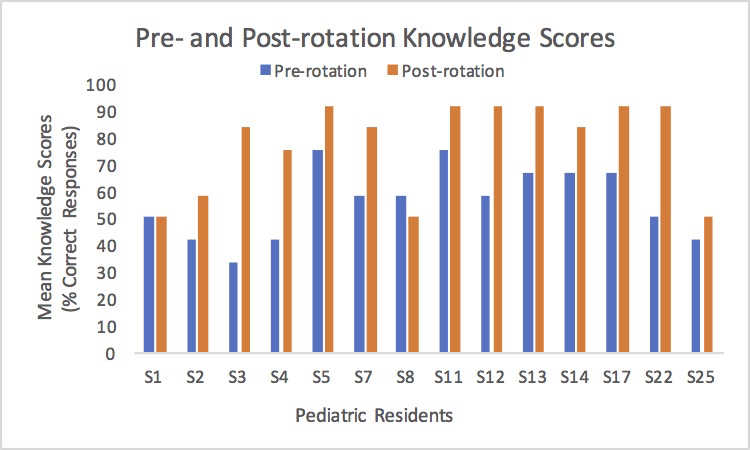Session Information
The 2020 Pediatric Rheumatology Symposium, originally scheduled for April 29 – May 2, was postponed due to COVID-19; therefore, abstracts were not presented as scheduled.
Date: Thursday, April 30, 2020
Title: Poster Session 1
Session Type: ACR Abstract Session
Session Time: 6:00PM-7:00PM
Background/Purpose: Self-efficacy and knowledge in core pediatric rheumatology (PR) topics are generally low among pediatric residents before their mandatory rotations in PR. The teaching style and content vary over the course of each resident’s rotation, and improvement in self-efficacy and knowledge has not been established. The objective of this study was to improve self-efficacy and knowledge in PR among general pediatric residents through the introduction of a standardized teaching series. Specifically, we aimed to increase the mean self-efficacy score from an estimated baseline of ≤5 pre-rotation to ≥7 post-rotation (on a 10-point Likert scale), and the mean knowledge score from an estimated baseline of ≤60% pre-rotation to ≥80% post-rotation.
Methods: Interactive presentations on 4 core PR topics (Juvenile Idiopathic Arthritis, Systemic Lupus Erythematosus, Kawasaki Disease, and Macrophage Activation Syndrome) were developed and delivered by PR fellows to general pediatric residents during their rotations. Self-efficacy (16 questions on a 10-point Likert scale) and knowledge (12 multiple choice questions) were assessed using questionnaires pre- and post-rotation. Questions were mapped to learning objectives and were based, where possible, on examination objectives for general pediatrics. Mean scores for self-efficacy and knowledge were determined. We examined the difference between pre- and post-rotation scores with the Wilcoxon signed-rank test. Statistical significance was defined by a p-value of ≤0.05. Qualitative feedback was collected using open-ended questions.
Results: Twenty five residents were provided the teaching series during their PR rotations from January to December 2019. Mean self-efficacy score was 4.4 and mean knowledge score was 58.3% pre-rotation (n=22). Among residents who completed both the pre- and post-rotation questionnaires (n=14), 100% and 86% showed improvement in their individual mean self-efficacy and knowledge scores, respectively (fig. 1 and 2). Overall mean self-efficacy score increased from 4.0 pre-rotation to 7.4 post-rotation (p< 0.001), and mean knowledge score increased from 56.0% pre-rotation to 77.4% post-rotation (p=0.002). Qualitatively, residents felt the teaching was effective, topics chosen were relevant, and the teaching series should be implemented formally into future general pediatric residents’ PR rotations.
Conclusion: Introduction of a standardized teaching series in core PR topics improved self-efficacy and knowledge among general pediatric residents from the beginning to end of their PR rotations. Several knowledge questions were challenging, which may explain why the 80% target post-rotation was not achieved. Qualitative feedback from residents was highly positive. This data supports integration of this standardized teaching series into the PR rotation. Future directions include a re-evaluation of the knowledge questions, development of presentations on additional PR topics, and administrative facilitation for scheduling and delivery of the teaching series.
To cite this abstract in AMA style:
Limenis E, Alsaleem A, Tam H, Lahiry P, Neufeld K, Tse S. Improved Self-efficacy and Knowledge in Pediatric Rheumatology Among General Pediatric Residents Following the Introduction of a Standardized Teaching Series [abstract]. Arthritis Rheumatol. 2020; 72 (suppl 4). https://acrabstracts.org/abstract/improved-self-efficacy-and-knowledge-in-pediatric-rheumatology-among-general-pediatric-residents-following-the-introduction-of-a-standardized-teaching-series/. Accessed .« Back to 2020 Pediatric Rheumatology Symposium
ACR Meeting Abstracts - https://acrabstracts.org/abstract/improved-self-efficacy-and-knowledge-in-pediatric-rheumatology-among-general-pediatric-residents-following-the-introduction-of-a-standardized-teaching-series/


